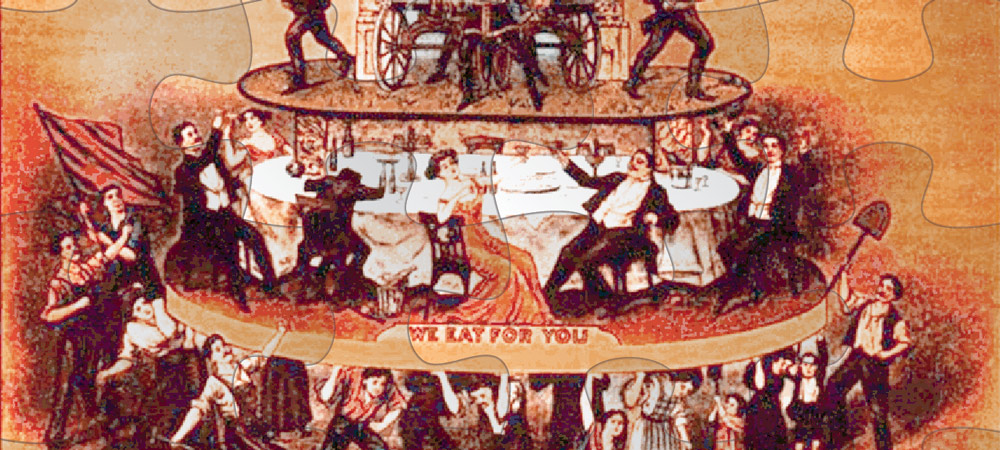On 14 September 1867, Karl Marx finally got his first Volume of Capital: a critique of political economy published. He had been toiling away in the reading room of the British Museum library for more than ten years in order to deliver his great work on political economy in the midst of trying circumstances of poverty, family illness and death and non-stop activity in trying to develop an international organisation of working people to struggle for labour against capital.
The book first came out in German, many years before it appeared in French and English. And it was generally met by silence and ignorance. Reviews of the book were few and far between, some of which, Marx’s life-long friend and colleague, Friedrich Engels, had to write himself to spark some interest.
But now 150 years later, Capital is a book that many millions have heard of, not just economists, even if not so many has actually read it. In substantial parts, it is not easy to read and understand – especially the early chapters, but in others it is an absorbing and powerful account of the iniquities and vampire-like nature of capitalism in its description and analysis of the rising industrial base of the then leading capitalist economy, Great Britain. As Marx describes towards the end of Capital, “If money comes into the world with a congenital blood-stain on one cheek,” he says, then “capital comes dripping from head to toe, from every pore, with blood and dirt.”
What does Marx’s Capital tell us about the world of 1867 and for that matter, 2017? First and foremost, Marx shows that all the things and services we need come from the exertion of labour. As Marx commented in a letter about his book, “Every child knows a nation which ceased to work, I will not say for a year, but even for a few weeks, would perish. Every child knows, too, that the masses of products corresponding to the different needs required different and quantitatively determined masses of the total labour of society.”
Only labour creates value. But even more, says Marx’s Capital, that value is not created by people who control its production and use. Under a capitalist system of production, the ownership of the means of producing value is in the hands of a few while the vast majority owns nothing except their ability to sell their labour power. Thus, value is appropriated by capitalists as a surplus over and above the value need to keep workforce alive and functioning. The power over investment, incomes and employment is with capital, not labour. That surplus value is then divided among the industrial capitalist as profit, the finance capitalists as interest and the landlords as rent.
Here Marx’s Capital is in direct opposition to the economic theory of mainstream, the apologists for the capitalist system. They reckon profits are the risk reward for investing by capitalists; interest is the reward for risky lending by bankers and rent is the reward for letting out land for use. Marx’s Capital shows that this is nonsense. Instead, profit, interest and rent are the product of the exploitation of labour and the private appropriation of the value created by labour.
So, for Marx, capital is not a thing, like a factory or a robot or an amount of money, it is a specific social relation. A factory is privately owned and labour must work in it without any say in its operation. But because capital is a social relation – value appropriated from labour and circulated by capitalists to make more value or money, it is also transient. Capitalism has not always existed or even been a dominant mode of production; and so it is not eternal and the only way for human beings to run their societies, whatever the economist of capitalism may say.
And Capital shows why it is transient. There is a fundamental contradiction between the production of things and services we need (Marx calls this use-values) and the need for the private owners of means of production and controllers of our labour to make a profit (Marx calls this exchange value).
Capital is a money-making system, not one of production for social need. But that very contradiction leads to regular and recurrent collapses in capitalist production because as capitalist compete against each other to gain more profit and greater market share, they try to drive down the use of labour and replace it with more machines and technology. The drive to make profit through increasing the productivity of labour leads eventually to less profit per capital invested. Thus capital causes its own collapse.
But social systems can dominate for a long time. The ancient slave economies of Europe lasted several hundred years; the absolutist regimes of Asia in India and China even longer; the feudal system of Europe for more than a thousand years. When Marx published Capital in 1867, capitalism had only become dominant as a system in Britain. It took another hundred years before it became dominant in Europe, North America and parts of Asia. Indeed, only 150 years later can we talk of capitalism as global system. But Marx’s Capital foresaw what we now call globalisation through the necessity for capital to expand to counteract collapses in profitability. Thus in 2017, we have a world economy now dominated by rich imperialist countries like the US, Germany and Japan, also rising capitalist powers that have emerged like India, Brazil and the rest of Asia and Latin America. Capital is now global along with the law of value as described in Marx’s Capital 150 years ago.
It has been a combined and uneven development. India was colonised by British imperialism for centuries and its labour exploited. But now its national capitalists, in combination with foreign capital, exploit the burgeoning Indian industrial proletariat with sweated labour and the latest technology.
But the evidence of the last 150 years shows that Marx Capital was right. Capitalism cannot meet its own objective of squeezing yet more profit out of labour and also take human society out of a world of toil, poverty, unemployment and degradation. The Great Recession of 2009 confirmed that crises under capitalism do not go away; indeed they are more severe and now synchronised globally. The rapacious vampire-like drive for more surplus value is destroying the planet through pollution and global warming.
But there is one contradiction in capitalism which is also the solution. As Marx showed in his book, capital creates its own nemesis, the proletariat. The British industrial working class that Marx describes in Capital may have declined in size, but the industrial working class of the world has never been larger, with billions in the growing workforces of India, Brazil, China and Africa. Labour has never been stronger in its conflict with Capital 150 years after Marx’s book was published.










